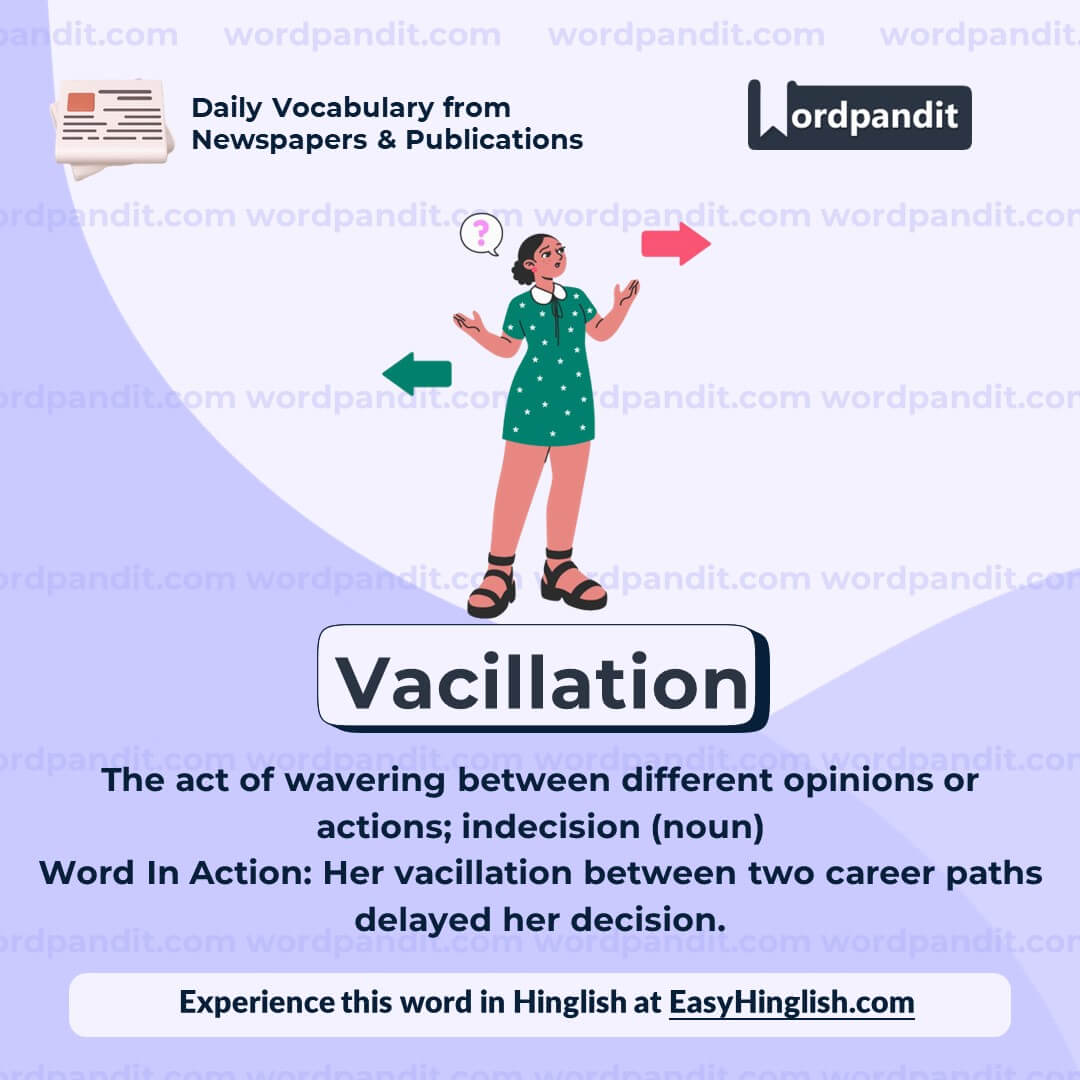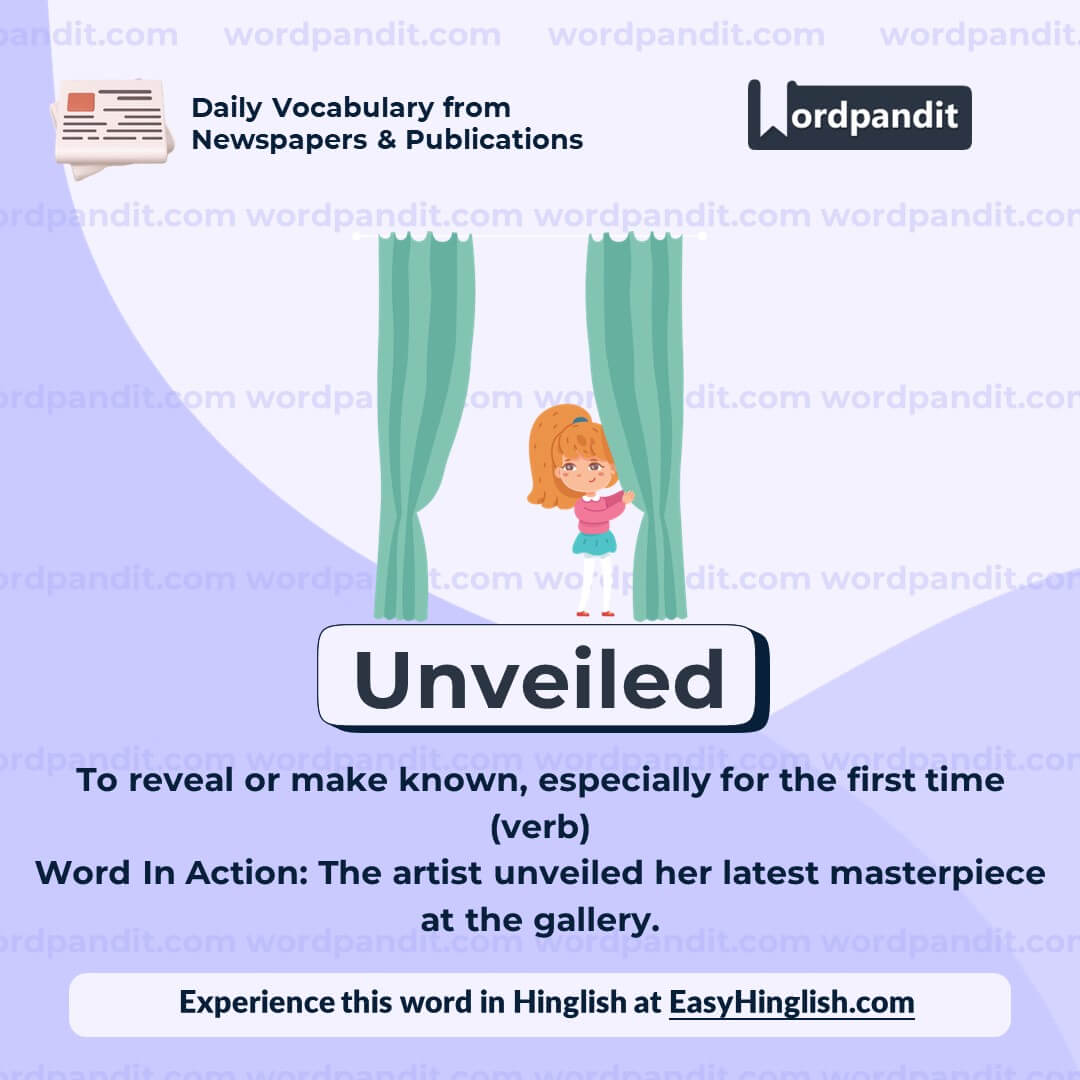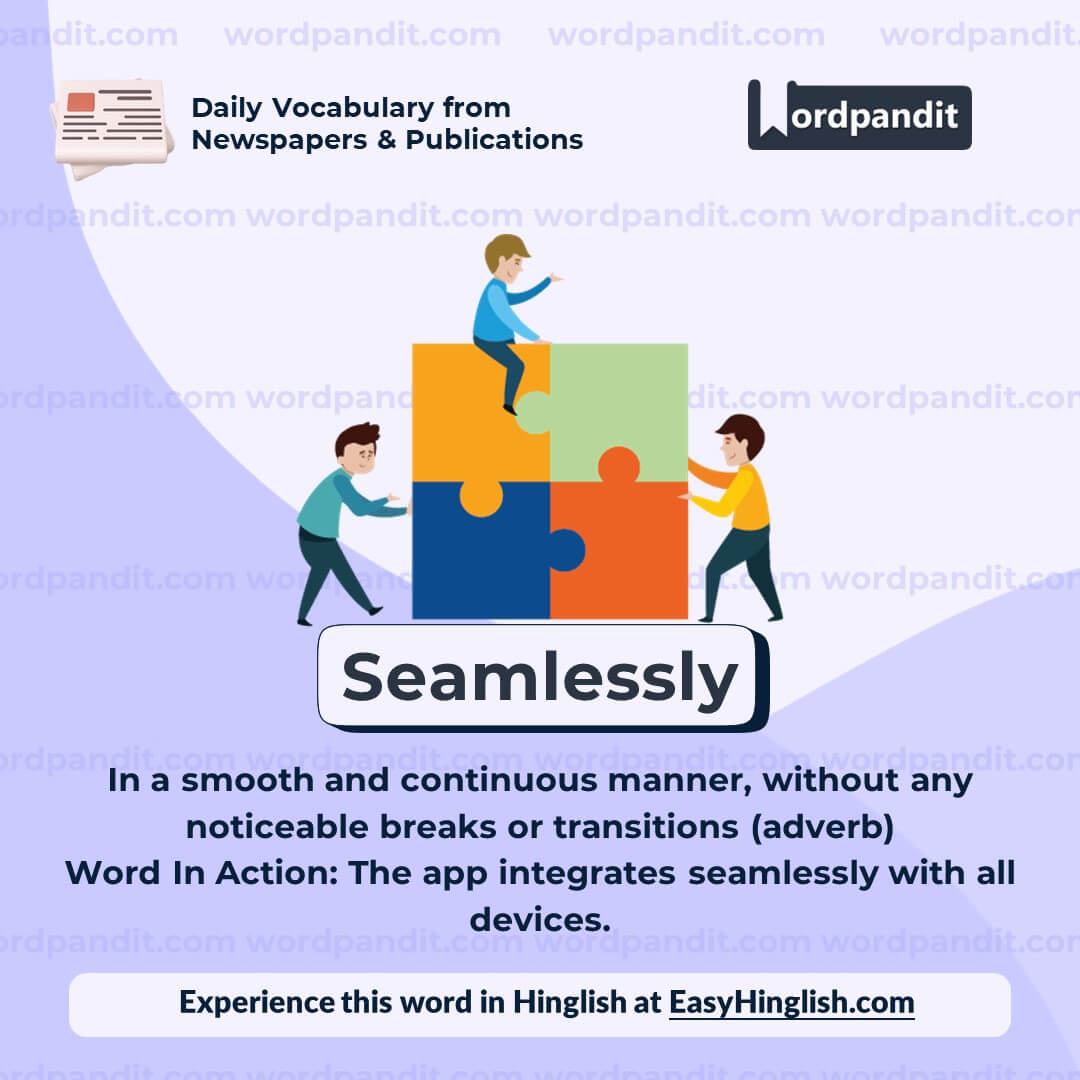Daily Vocabulary from Indian Newspapers and Publications
Welcome to Wordpandit’s Indian Vocabulary Hub
At Wordpandit, we understand the importance of staying rooted in the local context while expanding your language skills. This section focuses on enriching your vocabulary with words and phrases drawn from India’s leading newspapers and publications, ensuring you're learning vocabulary that is practical, relevant, and uniquely Indian.
Why Indian Sources Matter
We believe that the best way to master any language is by immersing yourself in local content. That’s why we carefully curate vocabulary from top Indian publications, including:
- The Hindu
- The Times of India
- The Economic Times
- Hindustan Times
- Live Mint
- The Indian Express
- And many others...
Stay Updated, Stay Relevant
With daily updates from Indian news sources, you’ll be consistently learning words that reflect the trends and shifts in Indian society and culture. Our focus is to provide vocabulary that enhances your understanding of the language in an Indian context.
How Wordpandit Supports Your Goals
Whether you’re preparing for exams, aiming to improve your professional communication, or simply want to stay connected with the latest Indian vocabulary, Wordpandit is here to guide you every step of the way.
Learn with a Practical Approach
Our interactive learning methodology includes real-world examples, engaging activities, and context-specific usage to ensure that every word becomes part of your active vocabulary.
Dive into Indian Vocabulary Today!
Why Choose Wordpandit?
Practical Learning: Focus on words you'll actually encounter in real-world reading, enhancing your comprehension and communication skills.
Diverse Content: From current affairs to scientific breakthroughs, our varied sources expose you to vocabulary across multiple domains.
Effortless Integration: Make Wordpandit a part of your daily routine. Just a few minutes each day can significantly boost your lexicon over time.
Your Path to Vocabulary Mastery
- Visit our Daily Vocabulary section regularly
- Explore new words and their usage in context
- Practice incorporating these words into your own writing and speech
- Track your progress as your vocabulary expands
Start Your Journey Today
Embark on your vocabulary enhancement journey with Wordpandit. By consistently engaging with our daily posts, you'll build a robust vocabulary that serves you well in academic, professional, and personal contexts.
Remember, a word a day keeps linguistic limitations at bay. Make Wordpandit your daily companion in the quest for vocabulary excellence!
WORD-1: Etched
Context:
"But perhaps the most devastating damage is invisible: the collective trauma etched into the psyche of every Gazan, including those tasked with healing others." - The New Indian Express
Explanatory Paragraph:
The word "etched" refers to something that is deeply and permanently inscribed, often leaving a lasting impression, whether physically, emotionally, or metaphorically. In this context, it describes how trauma is deeply ingrained in the minds and experiences of the people of Gaza.
Meaning: To carve or engrave something, or to impress something deeply or permanently (verb).
Pronunciation: "etcht"
Difficulty Level: ⭐⭐ Intermediate
Etymology: The word originates from the Dutch word "etsen," meaning "to eat away," which is related to the German "ätzen." It originally referred to the process of using acid to engrave designs on metal or glass.
Synonyms & Antonyms:
Synonyms: Engraved, inscribed, imprinted, embedded
Antonyms: Erased, obliterated, removed, effaced
Usage Examples:
- The artist carefully etched the intricate design onto the metal plate.
- The memory of her kind words was etched in his heart forever.
- Every detail of the historic event is etched into the pages of history.
- The pain from that day was etched into her face, evident to everyone who saw her.
Cultural Reference:
"Etched in Stone" is a common phrase often used to suggest permanence and unchangeability, reflecting the word's association with lasting impressions in culture and history.
Think About It:
How do certain experiences become so deeply etched into our memories or identities, and how does this influence our actions and decisions?
Quick Activity:
Think of a memory or moment that is "etched" in your mind. Write a short paragraph describing why it is so significant to you.
Memory Tip:
Picture the word "etched" as if it is permanently engraved on a stone. This image will help you associate the word with something deeply and permanently impressed.
Real-World Application:
The word "etched" is frequently used in emotional, artistic, and historical contexts to describe lasting impressions. For instance, it can be used in personal storytelling, art critiques, or when describing events that leave a profound impact.
WORD-2: Vacillation
Context:
"And any ‘moral support’ for it from a special committee, only reiterated the MoD’s persistent vacillation on critical issues with regard to military modernisation." - The Wire
Explanatory Paragraph:
The word "vacillation" refers to indecision or the inability to make a firm choice between different options. It often suggests a lack of resolve, leading to wavering or delay in action. In the provided context, it highlights the Ministry of Defence's hesitation and inconsistency in addressing military modernization efforts.
Meaning: The act of wavering between different opinions or actions; indecision (noun).
Pronunciation: "vas-uh-LAY-shuhn"
Difficulty Level: ⭐⭐⭐ Advanced
Etymology: Derived from the Latin word "vacillare," meaning "to sway" or "to waver," the term has been used in English since the 17th century to denote indecisiveness.
Synonyms & Antonyms:
Synonyms: Hesitation, wavering, indecision, irresolution
Antonyms: Certainty, decisiveness, determination, resolve
Usage Examples:
- The leader's vacillation on key policies frustrated the party members.
- Her vacillation over which career path to take caused unnecessary delays in her plans.
- The company's vacillation between strategies weakened its market position.
- Despite the urgency of the matter, his vacillation suggested a lack of confidence in his own judgment.
Cultural Reference:
In political discourse, "vacillation" is often criticized as a trait of ineffective leadership, as it symbolizes an inability to commit to a course of action, potentially leading to stagnation or failure.
Think About It:
Why do you think people or organizations vacillate when faced with critical decisions? How can such tendencies be mitigated?
Quick Activity:
Write a short paragraph describing a time when you experienced vacillation. Reflect on how it affected the outcome of the situation and what you learned from it.
Memory Tip:
Remember "vacillation" by associating it with the image of someone swaying back and forth, unable to take a step forward. This helps link the term to the idea of indecision.
Real-World Application:
"Vacillation" is often used in discussions about leadership, strategy, and policy-making. Recognizing and addressing vacillation can lead to more decisive and effective decision-making in both personal and professional contexts.
WORD-3: Unveiled
Context:
"Boxing Day China unveiled its latest advancement in military aviation: a sixth-generation fighter, unofficially designated the J-36, which features artificial intelligence, drone integration, and advanced electronic warfare capability." - The Wire
Explanatory Paragraph:
The word "unveiled" refers to the act of formally revealing or introducing something to the public, often for the first time. It implies a sense of ceremony or significance, as it is typically associated with important announcements or breakthroughs. In the context provided, it describes China's public introduction of its advanced military aircraft.
Meaning: To reveal or make known, especially for the first time (verb).
Pronunciation: "uhn-VAYLD"
Difficulty Level: ⭐ Intermediate
Etymology: Derived from the prefix "un-" meaning "not" and "veil," which originates from the Old French word "veil," meaning "covering." The term has been used since the 15th century to denote the act of removing a covering or making something known.
Synonyms & Antonyms:
Synonyms: Revealed, disclosed, introduced, announced
Antonyms: Concealed, hidden, obscured, covered
Usage Examples:
- The company unveiled its latest smartphone model at a grand event in New York.
- The artist unveiled her new painting during the gallery's opening night.
- The government unveiled its plans to improve infrastructure over the next decade.
- The mystery was finally unveiled when the detective shared the evidence with the jury.
Cultural Reference:
In the world of technology, major companies like Apple and Tesla often "unveil" their new products in grand events, highlighting the term's association with significant and high-profile announcements.
Think About It:
Why do you think the act of unveiling something carries such a strong connotation of importance and anticipation in modern culture?
Quick Activity:
Imagine you are unveiling a groundbreaking invention. Write a short paragraph describing the invention and the event where you reveal it.
Memory Tip:
Think of "unveiled" as removing a "veil" from something, making it visible to the world. This visual can help you recall its meaning.
Real-World Application:
"Unveiled" is frequently used in journalism, marketing, and public relations to announce new products, technologies, or ideas. Understanding this term can help in interpreting news and recognizing its use in formal settings.
WORD-4: Seamlessly
Context:
"It did not. It carried on seamlessly, from one bombing to the next, stripping away layer upon layer of Palestinian flesh, just as the Russian aggression on Ukraine carried on, or the forgotten conflict in Sudan." - The Wire
Explanatory Paragraph:
The word "seamlessly" means smoothly and continuously, without any noticeable interruptions, gaps, or flaws. In this context, it conveys the grim idea that the series of bombings progressed without any pause or visible disruption, highlighting the relentless nature of the violence.
Meaning: In a smooth and continuous manner, without any noticeable breaks or transitions (adverb).
Pronunciation: "SEEM-lis-lee"
Difficulty Level: ⭐ Intermediate
Etymology: Derived from the word "seam," meaning a line where two pieces are joined, and the suffix "-lessly," indicating the absence of something. The term has been used metaphorically since the mid-20th century to describe smooth transitions or uninterrupted processes.
Synonyms & Antonyms:
Synonyms: Smoothly, continuously, effortlessly, fluidly
Antonyms: Disjointedly, clumsily, awkwardly, disruptively
Usage Examples:
- The app allows users to switch between devices seamlessly.
- Her speech flowed seamlessly from one topic to another.
- The transition between the two departments was handled seamlessly by the management team.
- Thanks to the advanced technology, the video streamed seamlessly even in low bandwidth conditions.
Cultural Reference:
In the tech industry, the term "seamlessly" is frequently used to describe the ideal functionality of devices, software, or processes, such as seamless integration between apps or platforms.
Think About It:
What factors contribute to creating seamless processes or experiences, and why are they so highly valued in today’s fast-paced world?
Quick Activity:
Identify a situation in your daily life where something functions seamlessly. Write a sentence describing why it feels effortless or smooth.
Memory Tip:
Think of "seamlessly" as removing the "seams" or joins from a fabric, creating a smooth and uninterrupted surface. This imagery helps reinforce its meaning of smoothness and continuity.
Real-World Application:
The concept of "seamlessly" is crucial in areas like customer service, user experience design, and automation, where uninterrupted and smooth processes enhance efficiency and satisfaction.
WORD-5: Insatiable
Context:
"Jones indices, had discovered an insatiable, unquenchable, inextinguishable appetite for massacre. Massacres fuelled capitalism in 2024." - The Wire
Explanatory Paragraph:
The word "insatiable" describes an appetite, desire, or craving that is impossible to satisfy. It suggests an unrelenting and endless yearning for something, often with negative connotations, as in the context where it highlights an unquenchable greed or hunger for violence and destruction to fuel capitalism.
Meaning: Impossible to satisfy; always wanting more (adjective).
Pronunciation: "in-SAY-shuh-buhl"
Difficulty Level: ⭐⭐ Intermediate
Etymology: Derived from the Latin word "insatiabilis," formed by "in-" (not) and "satiabilis" (able to be satisfied), from "satiare" (to fill or satisfy).
Synonyms & Antonyms:
Synonyms: Unquenchable, voracious, ravenous, limitless
Antonyms: Satisfied, content, satiated, fulfilled
Usage Examples:
- The billionaire's insatiable quest for wealth led to unethical business practices.
- Her insatiable curiosity about the world made her an avid traveler and learner.
- The media's insatiable appetite for sensational stories often overlooks more critical issues.
- The child had an insatiable hunger for candy after Halloween.
Cultural Reference:
The phrase "an insatiable appetite" is frequently used in literature and pop culture to describe unrestrained ambition or greed, such as in Shakespeare’s works or modern critiques of corporate greed.
Think About It:
What drives the insatiable desires in modern society, and how can they be balanced with sustainability and ethical considerations?
Quick Activity:
Think of something you or someone you know has an insatiable desire for. Write a short sentence describing how this desire manifests in behavior.
Memory Tip:
Remember "insatiable" by breaking it into "in-" (not) and "satiable" (able to be satisfied). This helps to reinforce the idea of something that cannot be fulfilled.
Real-World Application:
"Insatiable" is widely used to describe excessive desires, whether in personal contexts (e.g., insatiable hunger for success) or societal critiques (e.g., insatiable corporate greed). Recognizing its implications can foster discussions on moderation and ethics.


















